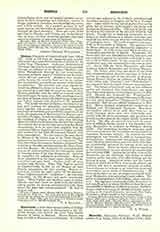

Menochio, GIOVANNI STEFANO, Jesuit Biblical scholar, b. at Padua, 1575; d. in Rome, February 4, 1655.
He entered the Society of Jesus, May 25, 1594. After the usual years of training and of teaching the classics, he became professor of sacred scripture and then of moral theology at Milan; thereafter began his long life of superiorship. He was successively superior of Cremona, Milan, and Genoa, rector of the Roman College, provincial of the provinces of Milan and Rome, assistant of Italy, and admonitor to the Fathers-General Carafa and Piccolomini. The exegetical work of Menochio is still deservedly famous. His first essay along this line was a politico-Biblical study: “Hieropoliticon, sive Institutions Politic ae e Sacris Scriptures depromptae”, 956 pages (Lyons, 1625). This book on theocratic politics was dedicated to Cardinal Alessandro Orsini. A second edition (Cologne, 1626) was dedicated to Ferdinand III. The Jesuit poet Sarbiewski made this study the subject of an ode (see “Lyrica”, II, n. 18).
The next year there appeared an economic study of the Bible: “Institutions Economiem ex Sacris Litteris depromptae”, 543 pages (Lyons, 1627). The author translated into Italian these lessons on the care of one’s own household; this translation was a posthumous publication: “Economia Christiana”, 542 pages (Venice, 1656). The work by which Menochio lives and will live is his “Brevis Explicatio Sensus Litteralis Sacrae Scriptures optimis quibusque Auctoribus per Epitomen Collecta”, 3 vols., 115 pages, 449, 549 + 29 (Cologne, 1630). Many other editions of this commentary have been published in many lands: Cologne, 1659; Antwerp, 1679; Lyons, 1683, 1697, 1703; the revised editions of Tournemine, S.J., published at Paris, 1719, 1721, 1731; Avignon, 1768; Ghent, 1829; the enlarged and revised editions of Zaccaria, S.J., published at Venice, 1743, 1755, 1761. The scholia of Menochio are introduced into the “Biblia Magna” and “Biblia Maxima” of de La Hoye; the “Biblia Sacra” of Lucas Brugensis; the “Cursus Script. Sacr.” of Migne; fourteen editions of the “Sainte Bible” of Corriere, S.J.; and “La Sainte Bible” of Drioux (Paris, 1873).
The clearness, brevity, and critical acumen of Menochio have won him the praise of friend and foe. The father of modern criticism, Simon, though not at all in sympathy with the orthodoxy of the Jesuit, says: “C’est un des plus judicieux scoliastes que nous ayons tant sur le Vieux que sur le Nouveau Testament” (Hist. Crit. du N. T., xliv). Reusch (Kirchenlex.) prefers the notes of Menochio to those of Sa and Mariana. The method of this great commentator was that of the best Catholic exegetes of today; a method which sought to find the literal meaning of Holy Writ in the Bible and the Fathers. Menochio studied the text in its original, and brought to bear upon that study a vast store of knowledge of Jewish antiquities.
WALTER DRUM

